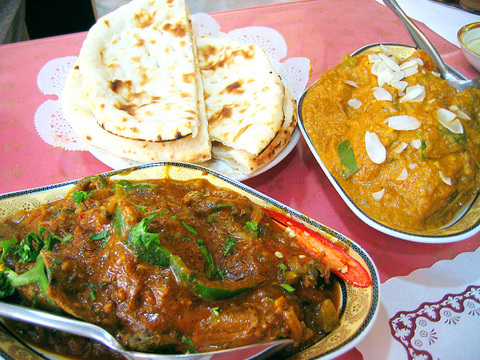Over the past couple of years the number of South Asian eateries in Taipei has climbed to an all-time high. Sadly, however, the increase in numbers doesn't mean that good Indian or Pakistan fare is readily available. Some of the joints might boast "the real thing" in their adverts, but the reality is often different.
All too often, regular butter is substituted for ghee, naan breads are fried instead of baked and plain white rice is served as a sad surrogate for pulao rice. The bottom line is that there are still only three or four South Asian joints worth visiting in Taipei if you have a hankering for genuine Indian-Pakistan fare.
One place that is worth a visit is the recently opened Aaleja. Top Pakistani chef, NA Choudry's eatery may have been open less than two months, but Taipei's newest Indian-Pakistan restaurant has already staked its claim to a top spot in the very short list of good South Asian eateries.

PHOTO: GAVIN PHIPPS, TAIPEI TIMES
Tucked away in an alley adjacent to Yanji Street, Aaleja ("King" in English), serves up a good selection of popular and lesser-known dishes from both Pakistan and India. The interior design is minimalist, with a smattering of Asian themes. Seating is comfortable.
The menu is packed with appetizers, side dishes, mutton, chicken, beef, fish and vegetable curries as well as a good selection of biryani and tandoori platters and, of course, plenty of breads. All the meats served are Halal and while alcoholic beverages are not on the menu patrons are free to bring in their favored tipple.
Price-wise, Aaleja is on a par with Taipei's other three leading South Asian diners. On average it will cost diners between NT$800 and NT$1,000 for a slap-up dinner for two, or about NT$400 for one person. A few recommendations for a sumptuous meal at the Aaleja include aloo tikka (NT$130), mutton bhuna (NT$390), chicken zafrani (NT$450), seekh kabab (NT$290), zeera aloo (NT$210), chana masala (NT$260) and mutton pulao (NT$220). The naan bread is good.
Along with the regular menu the joint also serves up a lunch special in which diners can enjoy a set meal of soup, main course, bread, rice and salad, all for NT$195. It's cheap and there's certainly nothing wrong with the fare, but the special probably won't alleviate the hunger pangs of true curry purists.
In addition to the great chow, service at Aaleja is also worth a mention. When this reviewer hit the joint unannounced earlier this week with a ravenous posse of nine the staff didn't balk.
Orders were promptly taken and we were served an exceptional assortment of dishes. And, more importantly, there wasn't one complaint from any member of our party, which did include a couple of rather outspoken and fastidious diners.

We lay transfixed under our blankets as the silhouettes of manta rays temporarily eclipsed the moon above us, and flickers of shadow at our feet revealed smaller fish darting in and out of the shelter of the sunken ship. Unwilling to close our eyes against this magnificent spectacle, we continued to watch, oohing and aahing, until the darkness and the exhaustion of the day’s events finally caught up with us and we fell into a deep slumber. Falling asleep under 1.5 million gallons of seawater in relative comfort was undoubtedly the highlight of the weekend, but the rest of the tour

Youngdoung Tenzin is living history of modern Tibet. The Chinese government on Dec. 22 last year sanctioned him along with 19 other Canadians who were associated with the Canada Tibet Committee and the Uighur Rights Advocacy Project. A former political chair of the Canadian Tibetan Association of Ontario and community outreach manager for the Canada Tibet Committee, he is now a lecturer and researcher in Environmental Chemistry at the University of Toronto. “I was born into a nomadic Tibetan family in Tibet,” he says. “I came to India in 1999, when I was 11. I even met [His Holiness] the 14th the Dalai

Following the rollercoaster ride of 2025, next year is already shaping up to be dramatic. The ongoing constitutional crises and the nine-in-one local elections are already dominating the landscape. The constitutional crises are the ones to lose sleep over. Though much business is still being conducted, crucial items such as next year’s budget, civil servant pensions and the proposed eight-year NT$1.25 trillion (approx US$40 billion) special defense budget are still being contested. There are, however, two glimmers of hope. One is that the legally contested move by five of the eight grand justices on the Constitutional Court’s ad hoc move

Stepping off the busy through-road at Yongan Market Station, lights flashing, horns honking, I turn down a small side street and into the warm embrace of my favorite hole-in-the-wall gem, the Hoi An Banh Mi shop (越南會安麵包), red flags and yellow lanterns waving outside. “Little sister, we were wondering where you’ve been, we haven’t seen you in ages!” the owners call out with a smile. It’s been seven days. The restaurant is run by Huang Jin-chuan (黃錦泉), who is married to a local, and her little sister Eva, who helps out on weekends, having also moved to New Taipei